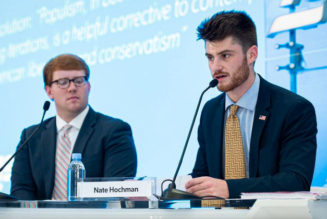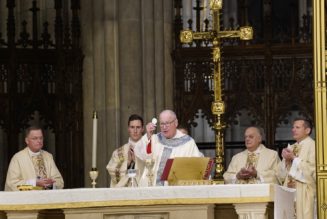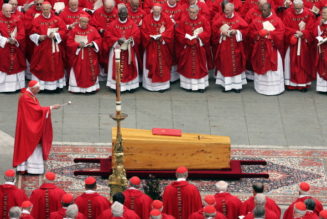By Phil Lawler ( bio – articles – email ) | Apr 26, 2024
Another week, another papal interview.
In the latest, broadcast by CBS (with a more extensive version to air in May), Pope Francis is asked about the many Catholics who have left the Church. His answer is revealing in several ways. He insists that there is “always a place” for Catholics in the Church. “If in this parish, the priest doesn’t seem welcoming, I understand,” he says; “but go and look elsewhere.”
Father Raymond de Souza, writing in the National Catholic Register, remarks that here the Pope seems to be endorsing the practice of “parish-shopping,” which is contrary to the norms of canon law. As Father de Souza puts it, “The norm is that your parish is where you live.”
True (and Father de Souza points this out as well), the Church has long recognized that many Catholics today worship outside their geographical parishes, and a 1970 Vatican statement concluded that “any pastoral action that is limited to the territory of the parish is outdated.” Nevertheless that same statement added that “the territorial principle remains in force.”
The reason for that “territorial principles” is simple. Someone—some pastor—is responsible for the spiritual welfare of every Catholic. If that person is not active in the Church, by default the responsibility falls to the pastor of the geographical parish where he lives. If a practicing Catholic is registered and active in a parish outside his home town, that is not a problem; the territorial principle exists precisely for the sake of inactive Catholics. If and when they do decide to go to church, they know where to go. In the worst case, there is someone responsible for giving them a Christian burial.
Pope Francis, in the CBS interview, encourages lapsed Catholics to shop around for a parish where they will feel welcome. That advice is understandable, but the way in which he offers it is less so. The Pope seems to take it for granted that if a Catholic leaves the faith, it is because “the priest doesn’t seem welcoming.” In that case, if he finds another parish with a cheerful friendly pastor, the problem is solved.
But what about those many Catholics who leave the Church because they have lost their faith? They are not likely to go parish-shopping, because they are not looking for another place to worship. They have no particular interest in Catholicism. So the challenge—the challenge offered by the CBS interviewer—is to give those lapsed Catholics a compelling reason to come back to the sacramental life of the Church.
The Pope’s answer to this question matches many of his complaints about the ordinary life of the Church. Again and again he traces pastoral problems to unwelcoming priests, to rigid and doctrinaire priests, to priests who are harsh and stern in the confessional, to the “doctors of the law.” No doubt there are a few such pastoral monsters, but in my experience they are vastly outnumbered by the priests who are uninspired and uninspiring, lax in doctrine and lackadaisical in the liturgy. For every cradle Catholic who left the Church because of a grumpy pastor, there are a dozen who left because they no longer saw any particular reason to get out of bed on Sunday morning. The problem is not a lack of welcome but a shortage of zeal.
Now for those Catholics who have drifted away for lack of interest, the Pope suggests that they will be welcome in one parish or another. But they aren’t looking for a welcome; they’re happy to be left alone.
Pope Francis has often rightly said that the first duty of the Church is evangelization: preaching the Gospel message, bringing people into the sacramental life of the Church. Telling people that they will be welcome is only a small part of that task. For more important is the work of telling people why they should want to be active Catholics.
The work of evangelization—or re-evangelization, as it applies to lapsed Catholics—is not to convince people that the Church will welcome them. (Still less is it to con them with suggestions that Catholic doctrine can adapt to fit their preferences.) Rather it is to persuade them that the Church offers the truth and the life that they need.
Evangelization begins and ends with the Eucharist, the source and summit of our spiritual life. So if some struggling Catholic is tempted to leave the Church, the key question to pose is the one that Peter asked Jesus: “Lord, to whom shall we go? You have the words of eternal life.”
Sound Off! CatholicCulture.org supporters weigh in.
All comments are moderated. To lighten our editing burden, only current donors are allowed to Sound Off. If you are a current donor, log in to see the comment form; otherwise please support our work, and Sound Off!











